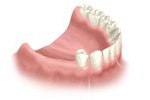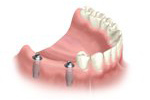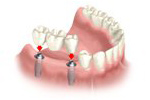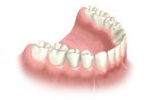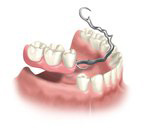DENTAL IMPLANTS

What are dental implants?
Dental Implants are the state of the art technology of replacing missing teeth. Dental Implants are made of Titanium or Titanium alloys. There are usually three parts to the implant restoration. The part that acts as a root, the part that acts as a tooth in the mouth, and the connection in between (called abutment). Implant restorations vary from single tooth replacements to full mouth restorations.
The periodontist, with the help of your dentist, is responsible for the root part of an implant. The root form implant is inserted in the jaw bone surgically.
It is important to understand that implant therapy is a team effort between yourself, your dentist and the periodontist. Everybody needs to be on the same page regarding diagnosis, planning, and treatment.
Why should I replace my missing teeth?
When a person loses his tooth/teeth their quality of life is affected.
Missing teeth has a devastating effect on the rest of dentition, replacing missing teeth aims at:
- Restoring function "chewing"
- Restoring esthetic smile
- Restoring phonetics and pronunciation
- Preventing the shifting and rotation of surrounding teeth
- Preventing lip and cheek collapse
- Preventing excessive stress on the rest of dentition
Can Implants replace my dentures?
Dental dentures can greatly benefit from implants. Implants can act as retainers for conventional dentures, or even replace the removable dentures with a fixed prosthesis that no longer needs to be inserted into or removed from the mouth. Ask your dentist or Dr. Shwetha about which treatment option best suits your needs.
Am I a good candidate for dental implants?
Most people with missing teeth or teeth that are soon to be lost are good candidates. If you don't have uncontrolled systemic diseases then you probably are a good candidate, even if you have complete or partial dentures. In some instances, the quality or quantity of bone is insufficient for straight forward implant placement, and further bone augmentation procedures are necessary. Ask your dentist or Dr. Shwetha about how dental implants can serve you.
How do I take care of my implants?
Contrary to common belief, implants can still develop a disease similar to periodontitis. Bacterial plaque can cause an infection around dental implants called peri-implantitis. Peri-implantitis causes continued bone loss around the implant, which may eventually lead to loss of the implant. The need for proper oral hygiene, along with follow up with your dentist and periodontist, are essential to evaluate the health and stability of dental implants. Peri-implantitis, although not common, should be diagnosed and immediately addressed, whether surgically or non-surgically, to allow maintenance of the implant and bone.
What are Teeth in One Day?
In some cases, implants can be placed at the same time as tooth extraction and a fixed prosthesis to be placed all in the same visit. This allows our patients to leave with a fixed tooth rather than a removal temporary, or even worse, no tooth at all. Only highly trained professionals offer this kind of treatment. You will need careful evaluation and 3-D imaging to determine if you are a good candidate. This cutting-edge dental surgery is highly technique sensitive and can be done to replace single teeth, or even all the teeth in the mouth at once. The results are often incredible.
SINGLE TOOTH REPLACEMENT
SINGLE TOOTH MISSING
 Benefits of an all-ceramic crown on implant:
When both the tooth and root are damaged, the best permanent replacement is a dental implant in conjunction with a ceramic crown. This solution both looks and functions just like a natural tooth.
Benefits of an all-ceramic crown on implant:
When both the tooth and root are damaged, the best permanent replacement is a dental implant in conjunction with a ceramic crown. This solution both looks and functions just like a natural tooth. In this case, a so-called one-piece implant is used. This means that all components are installed as a single unit, resulting in immediately full functioning teeth, shorter treatment time and minimized pain.
- Immediately functioning teeth
- Excellent esthetic result
- Life long, stable solution
This procedure normally includes four visits to the dentist. You should expect to be able to work the day after having the implant installed.
COURSE OF TREATMENT
INSTALLING THE NEW TOOTH – STEP-BY-STEP
The course of treatment described here is one of several options available. Consult your dentist to find out what the best solution is for you, given your specific condition.ALTERNATIVES TO AN ALL-CERAMIC CROWN ON IMPLANT
MULTIPLE TOOTH REPLACEMENT
SEVERAL TEETH MISSING
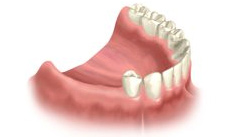 Benefits with a fixed bridge on implants:
In this case, when replacing three teeth in the far back of the mouth, a fixed bridge anchored to dental implants is the only fixed alternative. Traditional dentures can't offer the same stability or function.
Benefits with a fixed bridge on implants:
In this case, when replacing three teeth in the far back of the mouth, a fixed bridge anchored to dental implants is the only fixed alternative. Traditional dentures can't offer the same stability or function.Having dental implants replacing your lost back teeth will give you new, unparalleled strength and stability that allows you to eat what you want. It will also preserve your jawbone and facial appearance.
- The only fixed alternative in this situation.
- A stable, secure solution that lets you eat what you want
- Preserves your facial appearance and prevents bone loss
After the initial examination, you can expect 4-5 additional visits until the final fixed bridge is permanently attached. It is normal to experience some minor bruising and swelling in the gum and soft tissue afterwards. Any discomfort is usually treated with an ordinary painkiller. You should expect to be able to work the next day.








